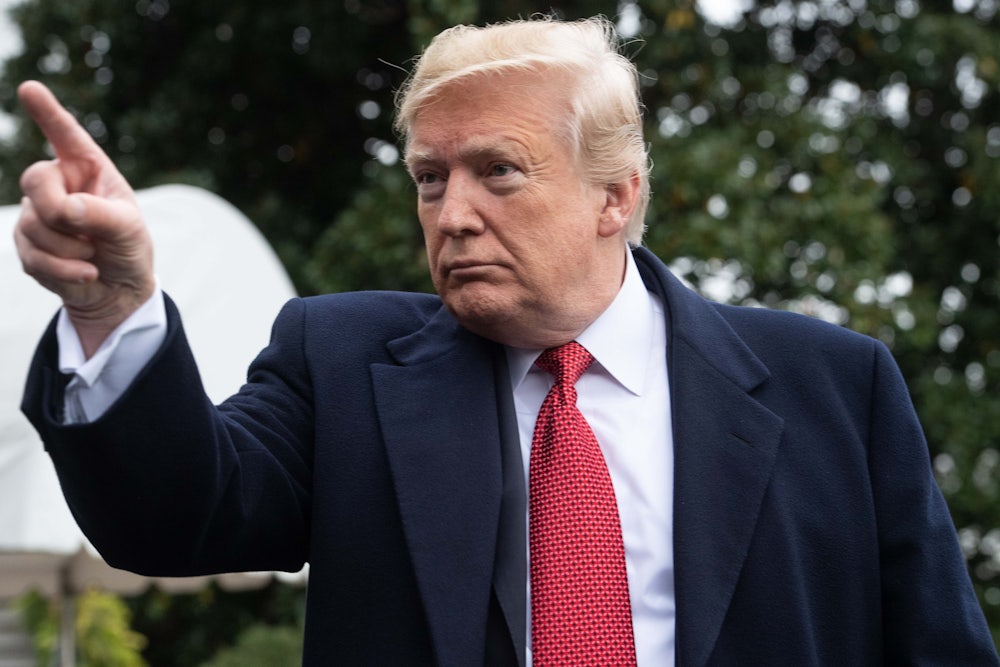While pundits debate whether there was a blue wave in last week’s midterm elections—there was—the White House is bracing for an onslaught from the new Democratic majority in the House of Representatives. Democrats are preparing to subpoena the Trump administration on at least 85 different matters. The list of targets include trivial and weighty subjects alike, the latter including Trump’s tax returns, the Russia investigation, the migrant family separation policy, the travel ban, and whether Trump is using the presidency to enrich his personal businesses.
Two opposing forces will shape these investigations: Congress’s power to oversee the executive branch, and the executive branch’s power to keep certain documents from Congress. Though executive privilege is not mentioned in the Constitution, the courts consider its use by George Washington and Thomas Jefferson to be the next best thing. Presidents from both parties have, with varying degrees of success, invoked the separation of powers to keep the executive branch’s internal deliberations hidden from the federal judiciary and from Congress.
Trump’s presidency has been characterized by impulsiveness and short-sightedness. When it comes to invoking executive privilege, however, the White House has been unusually strategic. The administration has opted not to invoke it at key moments, largely related to the Russia investigation, while selectively using it to protect documents related to Trump’s businesses and the nomination of Supreme Court Justice Brett Kavanaugh. These episodes could be instructive in how Trump wields the privilege in the political standoffs to come.
There are two notable instances where the White House avoided invoking the privilege. Last year, after Trump fired James Comey, the Senate Intelligence Committee invited the former FBI director to testify. Some political and legal observers speculated that the White House would use executive privilege to prevent him from doing so, but Trump instead took the path of least resistance, forestalling what would have been a bruising—and potentially fruitless—legal battle.
At around the same time, Trump hired lawyers John Dowd and Ty Cobb to lead his legal defense in the Russia investigation. The two men, in hopes of speeding up the inquiry, took a highly cooperative stance with special counsel Robert Mueller, including reportedly waiving executive privilege to provide him with numerous documents. Trump’s lawyers also made no effort to stop Mueller from interviewing former White House Counsel Don McGahn or other top administration officials about Comey’s dismissal.
This strategy wasn’t without its detractors. Former New Jersey Governor Chris Christie dismissed Cobb and Dowd as a “C-level legal team” for waiving the privilege so readily, which he said could harm Trump’s future legal defenses. (Christie is now reportedly under consideration to succeed recently fired Attorney General Jeff Sessions.) Cobb and Dowd left the president’s legal team earlier this year, and the once-cooperative approach may have left with them: Vanity Fair’s Gabriel Sherman reported in July that Emmet Flood, the president’s lead lawyer, is taking a more adversarial approach to the special counsel’s inquiries and invoking executive privilege more frequently.
In one notable instance—Sessions’s congressional testimony about Comey’s dismissal—the Trump administration took a murky and muddled approach. Rather than invoke executive privilege outright, Sessions avoided answering questions by telling lawmakers that it would be inappropriate to testify about his private conversations with the president, in case the White House wanted to invoke the privilege in the future. This rhetorical maneuver left lawmakers with few answers about what he witnessed during one of the Trump presidency’s most pivotal moments.
At other times, the White House has played hardball with investigators and invoked the privilege to stymie them. In an August report, the Government Services Administration’s inspector general said that Trump met twice with top GSA officials about the future of the FBI’s dilapidated headquarters in downtown D.C. The GSA ultimately decided to keep the headquarters on Pennsylvania Avenue rather than move it elsewhere, which would have led to the redevelopment of the FBI’s current site—a massive parcel that surely would have attracted hotel developers. Trump may have taken a special interest in the project because the headquarters are located right across the street from his D.C. hotel.
The Kavanaugh hearings led to another decisive blow to congressional oversight. Democrats wrangled with Republicans for months about the judge’s records from his days on the Whitewater investigation in the 1990s and the George W. Bush administration in the early 2000s. The GOP ultimately made only a fraction of his documents public. In September, Trump invoked executive privilege to withhold 100,000 pages of purportedly sensitive documents from Kavanaugh’s White House tenure. Chuck Schumer, the Senate Democratic leader, called the announcement a “Friday night document massacre.”
The White House, like any, will bend on some congressional requests and hold firm on others. Inquiries into besieged Cabinet members may be allowed to proceed, so long as they don’t touch the president himself. Scrutiny of controversial policies like the travel ban and the family separation policy may be hindered or curtailed, but not entirely thwarted. The closer the investigations get to Trump personally, though, the more he may resist them. It’s conceivable that probes into his conversations with top officials about the Russia investigation, and matters involving his children and businesses, will be fought all the way to the Supreme Court. But in doing so, Trump would be giving a roadmap into what deserves more scrutiny, not less.
In political terms, Trump will open any constitutional clash with a significant disadvantage. Many of his predecessors justified invoking executive privilege by citing the need to preserve the White House’s integrity as a coequal branch of government. Trump, by comparison, has shown little interest in the presidency as an institution, except insofar as it can be used to his benefit and to his political enemies’ frustration. So whenever he invokes executive privilege over the next two years, Democrats rightly will see it as a purely self-serving maneuver. They will smell the blood in the water.
